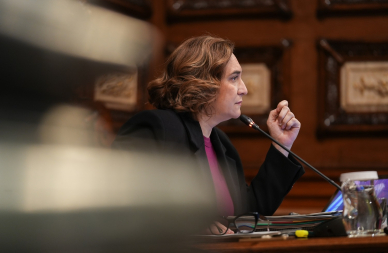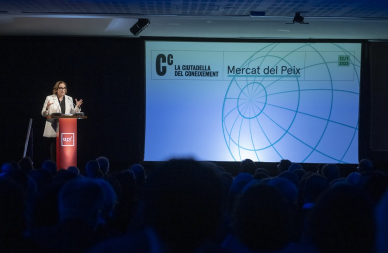24/02/2023
Get to know the Mayor better
Presentation of the Cities for Adequate Housing Declaration
Share it
Speech of the day 16/07/2018
“Either we prioritise life or we allow housing speculation, and we prioritise life.”
We are here, at this meeting, because of the sustainable development goals, a global agenda that we, who live in cities, consider to be absolutely essential. This is the main framework for action that we share, and these sustainable development goals include Number Eleven, which specifically refers to the need to develop sustainable cities. And therefore, we have to work together, we have to cooperate. Because, in effect, it’s not just that the vast majority of today’s population lives in cities and that, as everyone knows, this process of urbanisation will continue, but also that the vast majority of the sustainable development goals, the fight against inequality, against poverty and for education, for healthcare, etc. come about, or fail to come about, in our cities, in urban territories.
Therefore, as cities, we are key allies. This is one of the main messages that I would like to transmit, especially to state representatives and those from the United Nations. As cities, there are few opportunities where we enjoy a platform like this that enables us to transmit this need.
And more specifically, as the City of Barcelona, as the joint president of the CGLU, I would like to convey the urgent need to tackle the matter of the right to housing and the right to the city. Subjects that are recognised in the urban agenda, which also brings us together here, based on Habitat III and the many debates arising from it. These are not abstract rights, they are not abstract questions. Today, I would like to convey the urgent need to tackle housing as a basic, central question for ensuring human rights in general and the sustainable development goals in particular.
Right now, the situation is critical. Our cities are in danger. And when I say that our cities are in danger, I mean that life in our cities is in danger and that there is a risk that the future will be even less sustainable than the present.
We are suffering a process of global speculation, of the financing of housing, of large investment funds, with a lot of capital that moves around without borders, without any type of control. and which come to our cities and buy hundreds or thousands of residential buildings. For them, these are property assets, and therefore numbers, figures, which are only a starting point for subsequent stock market speculation where they make millions and millions in profits.
But this process means that the cost of living for our citizens goes up, it means that housing suffers more and more abusive price hikes, totally out of control. It means thousands and thousands of evictions. In other words, it effectively endangers the lives of the people living in our cities.
Therefore, if we agree that cities are a key territory for the specific development of human rights and the sustainable development goals, we must urgently ensure the right to housing, access to affordable housing, without any excuses.
And that is something that I want to convey, the specific part of this question. In other words, we are not speaking about rights in an abstract way. Mayors and local governments form the institutions that are closest to the general public. We live in the city, we go to school, do our shopping in neighbourhood shops and visit other neighbourhoods. We are approached by hundreds, thousands of families, and there are more and more families that may be vulnerable, excluded from the job market, but also middle-class families, families with good jobs, who cannot afford to pay for their homes.
And I want to convey this urgency, the fact that these families tell us: “Lady Mayor, I have to take my children out of school because I have to leave the neighbourhood where we have always lived, due to the price of housing.“ That has a tragic impact on our city model. In other words, we cannot afford to lose our citizens, because then we will lose the soul of our cities. I recently co-authored an article with the Mayor of London, Sadiq Khan. We said: “Cities are not the streets, they are not the buildings. Above all, and before anything else, they are the people who live there. Without people, there is no city. Without people, there is no sustainability. Without life, there is no sustainable project, not only for a city, but also for an economic model and for society as a whole. And that is not only a matter of families having access to housing. It is also an economic question. I would like to dwell on that. More and more companies say to me, as they do in many other cities: “Lady Mayor, we are interested in coming to Barcelona.” And, in reality, many strategic companies, such as technological businesses, are setting up in our city, but they are worried about housing, because they need their workers to live in the city, near to their places of work. And it is becoming more and more difficult for companies to find accommodation for their workers. I therefore insist that this is a question of human rights; it is a question of ensuring the life of our city, but it is also a matter of economic sustainability, a matter of safety. We are therefore risking everything in terms of access to housing and access to the city.
This is one of the basic questions, the housing emergency is much more than a matter of housing, it also goes to the heart of the sustainability and development that we wish to have in our cities and in our societies. This is why it is very important for us to be here, after a long process of many debates and the work of a lot of people. Many cities have been cooperating and here, today, for the first time, at the United Nations, many cities have come together, coordinated with a declaration, which President Parks Tau of the CGLU referred to previously, Cities For Housing, Cities for Adequate Housing. A declaration for the right to housing and the right to the city, with the constructive intention of finding solutions and determining starting points from which to coordinate joint action.
In only a few months, this declaration has attracted a lot of support, from New York City, where we are now, and from Barcelona, London, Paris, Montreal and Montevideo, who are accompanying us, as well as Berlin. Many cities, without forgetting: Lisbon, Seoul, Durban and Amsterdam. Cities, it should be stressed, from both the north and from the south. Because each nation has its regulations, every city has its own peculiarities. But there is one basic issue, which is the lives of our citizens in our cities and the process of global speculation that is threatening life in our cities. You have a copy of this declaration, so I won’t go into details now, and furthermore, we have launched a website where this declaration is available. I only wish to emphasise the main points as soundbites. Basically, we are saying, as cities: We need to ensure access to housing, and that depends on our obtaining more resources. We need more resources to increase our stock of affordable housing and we need more administrative powers. States need to understand that we are their main allies for finding and establishing solutions, but we need more administrative powers, specifically for regulating the property market, in order to stop speculation. And this is the key point, which cannot be further postponed. In other words, speculation and ensuring the right to housing are mutually exclusive. It is impossible to guarantee one thing if the other is allowed.
It is therefore necessary to prioritise the right to housing over speculation and we need specific regulations that are either implemented by the State, or the State must give cities the administrative powers they need to implement them. More powers, more resources for increasing our stock of affordable housing, choosing a range of options; in other words, not just public or private housing, but also cooperative housing, community housing, public-private collaboration. We need as many solutions as possible and we need the joint responsibility of all the stakeholders involved. And evidently, we must link the right to housing with the right to the city. In other words, these models from the past, in some cases promoted by big industrial housing producers, which were not suited to our way of life, the territory, sustainability or the culture of the place concerned, have all become obsolete. This model has already failed, and we therefore need adequate housing that is sustainable and fair and suited to the territory that implements it.
And we want to do all of this through cooperation among cities and, of course, with their corresponding state administrations. Believe me, cities are doing a lot, but we know that we are risking everything. We are implementing a lot of measures, but it isn’t enough. We need you. We need our states, we need the United Nations.
At a global level, we must understand what I said before: we either prioritise life or we allow housing speculation. And we prioritise life. I believe we are promoting global agendas that have attracted widespread support and which have meant a lot of work, such as the sustainable development goals, the urban agenda based on Habitat III, the Paris Climate Change Agreement. These are very important agendas with a wide consensus and all of them agree that they must be implemented in our territories, in our cities. This is why we are asking you to take us into account.
Today, states must understand that, in the same way that climate change is a threat to the planet, speculation threatens the life of our cities. And we have come here to ask you to trust in the cities. As the places closest to citizens, cities have been feminising their policies for a long time. We are feminising them out of pure raison d’être, because of our own nature. We are the government of everyday things. We are the government which understands that there is nothing more important than human life. And we are cooperating. in order to act and to find solutions. That is what we mean by “feminising policies”: putting people at the centre, and instead of competing, cooperating to find solutions. We invite the states to join us in this revolution, in the feminisation of politics. This is the time to act, in order to ensure the right to housing, to make life in our cities possible. Thank you very much.

